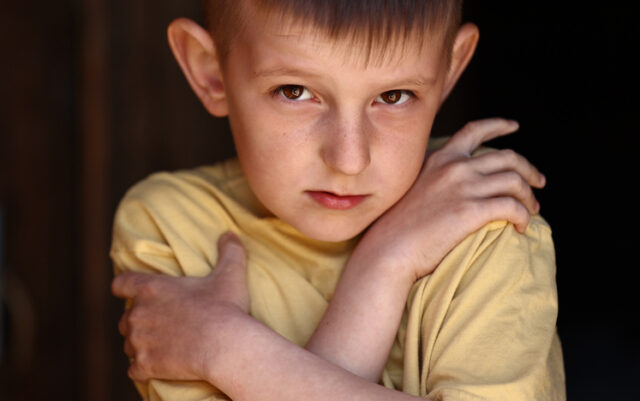Having a tough childhood isn’t just hard to cope with as you’re going through it — it sticks with you for the rest of your life.

While going to therapy, doing a lot of self-reflection, and working through some of the trauma and tough times you experienced can help you overcome a lot of the baggage your early years left you with, there are certain habits and behaviours that become deeply ingrained and are harder to rid yourself of. Here are just a few of the things you might struggle with if your childhood wasn’t that great.
1. Trusting anyone feels scary and potentially dangerous.

When the people who were supposed to protect you let you down, trust becomes a tricky thing. You may find yourself questioning people’s motives or expecting betrayal, even when there’s no reason for it. Learning to let your guard down can feel like trying to rewire your brain — but with the right people, it is possible.
2. You constantly second-guess yourself and every decision you make.

If you grew up with constant criticism or unpredictable reactions, making decisions as an adult can feel paralysing. You might question your own judgment, even on small things. The fear of getting it “wrong” often holds you back. Trusting yourself takes practice, but it’s a muscle that gets stronger the more you use it.
3. You’re terrified of being left behind.

Inconsistent love or care during childhood can lead to a deep-rooted fear that people will leave you. This can make relationships feel like a tightrope walk, where you’re always bracing for someone to disappear. Reassurance helps, but learning that you’ll be okay, even if someone leaves, is where true healing happens.
4. You feel awkward setting boundaries.

If your needs weren’t respected as a child, you might struggle to assert them as an adult. You might say “yes” when you want to say “no” or let people overstep. Healthy boundaries feel uncomfortable at first, but they’re crucial for protecting your peace and self-respect.
5. You overthink absolutely everything.

Growing up in an unpredictable environment teaches you to scan every situation for hidden dangers. That hyper-awareness turns into overthinking, where every comment, text, or situation gets dissected. While it kept you safe as a kid, as an adult, it can lead to exhaustion and anxiety. Learning to quiet that mental chatter takes time, but it’s worth it.
6. You use perfectionism as a coping method.

When mistakes weren’t tolerated or led to harsh consequences, perfectionism can become your default setting. You strive to get everything just right to avoid criticism or conflict. While this drive can lead to success, it often comes at the cost of your mental health. Embracing imperfection is a game-changer.
7. Expressing how you’re feeling definitely doesn’t come naturally.

If showing emotions wasn’t safe as a child, you may find it hard to let them out now. Anger, sadness, or even joy might feel too vulnerable to share. Bottling things up becomes second nature, but it also makes genuine connection harder. Learning to express emotions in healthy ways can feel freeing.
8. You feel like you’re never good enough.

Growing up with constant disapproval or impossible expectations can leave you with a lingering sense of inadequacy. No matter what you achieve, it never feels like enough. Recognising that this is a leftover feeling — not reality — is key to breaking free from it.
9. You go to great lengths to please other people.
 Source: Unsplash
Source: Unsplash If keeping everyone happy was a survival tactic in childhood, it’s no wonder you still find yourself bending over backwards for people. You might prioritise everyone else’s needs over your own, even to your own detriment. Learning to put yourself first without guilt is a powerful step toward balance.
10. Your self-worth is often at rock bottom.

A difficult childhood can chip away at your sense of value. You might feel like you have to “earn” love or that you’re inherently flawed. Building self-worth means reminding yourself, again and again, that you’re worthy just as you are — no conditions attached.
11. You’re independent to a fault.

If asking for help led to disappointment or rejection as a kid, you might pride yourself on doing everything alone. While independence is great, hyper-independence can isolate you and lead to burnout. Letting people in and accepting support doesn’t make you weak — it makes you human.
12. You rarely relax because you don’t feel safe.

Growing up in a tense or chaotic environment makes relaxation feel unnatural. Even in calm moments, you might feel on edge, waiting for the next disaster. Teaching your mind and body that it’s okay to relax takes practice, but it helps you feel more at ease in the world.
13. Forming healthy relationship is a tough task.

If your childhood relationships were full of conflict, neglect, or inconsistency, it can be hard to know what healthy connection looks like. You might gravitate toward familiar but unhealthy dynamics. Recognising and pursuing healthy relationship patterns can make all the difference.
14. You don’t really trust your own feelings.

If your feelings were dismissed or invalidated as a child, you might struggle to trust them now. You question if you’re overreacting or if what you feel is “right.” Learning to validate your own emotions, regardless of anyone else’s opinions, helps you build inner confidence.
15. You’re incredibly resilient, against all odds.

It’s not all negative. Surviving a difficult childhood often makes you incredibly resilient. You’ve learned to adapt, cope, and keep going even when things are tough. This strength is a part of you, and while it came from hardship, it’s proof of your incredible ability to overcome.




